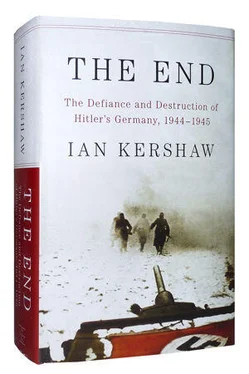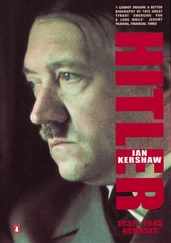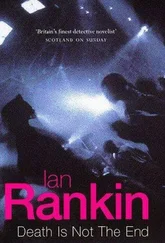129. BAB, R55/622, fo. 181, Briefübersicht Nr. 10, 9.3.45.
130. See von Oven, Finale Furioso , p. 579 (12.2.45), for Goebbels’ fury at Ley’s public claim that holding the Red Army at the Oder had been ‘The German Miracle’, at a time when tens of thousands were fleeing in panic and trying desperately to reach the western banks of the Oder.
131. Cited in Taylor, p. 428; Erich Kästner, Notabene 1945: Ein Tagebuch , Berlin, 1961, pp. 55–6 (8.3.45); Jacob Kronika, Der Untergang Berlins , Flensburg, 1946, p. 70 (22.3.45). Goebbels, often frustrated by Ley’s outspoken statements, noted in his diary the outrage at the latter’s comments about Dresden.— TBJG , II/15, p. 457 (9.3.45). Ley’s article, ‘Without Baggage’ (‘Ohne Gepäck’) had appeared on 3 March in Der Angriff , 53, p. 2. In a broadcast from the encircled Breslau two days later, Gauleiter Hanke picked up the theme, declaring that what had once been seen as essential cultural property ( unerläßliche Kulturgüter ) could be now viewed on closer inspection as ‘the thoroughly dispensable matter of civilization’ ( durchaus entbehrliches Zivilisationsgut ).—Kästner, p. 47 (5.3.45).
132. See David Irving, Goebbels: Mastermind of the Third Reich , London, 1996, p. 503.
133. BAB, NS19/1022, fo. 5, Brandt to Berlepsch, 3.1.45. The Lebensleuchter appears to have taken the form of a large candle in an elaborate Nordic-styled holder. According to a file notice, Himmler agreed a few days later to have all children of teachers at ‘NAPOLAs’ (Nationalpolitische Erziehungsanstalten)—Party schools (by this time under SS control)—presented with the ‘light of life’. SS-Obergruppenführer Heißmeyer, head of the NAPOLAs, was to give a list of the children to Himmler’s adjutant, SS-Standartenführer Dr Rudolf Brandt. The number of candleholders available was, however, Brandt warned, currently very small and they were intended only for a third or fourth war child, so that he did not know whether Himmler’s promise could be fulfilled. Heißmeyer said he would acquire the requisite details under a pretext and leave it to Brandt to decide to what extent the distribution of the candleholders could be carried out. The file notice on this absurd issue appears to have been consulted on the first day of February, March and April 1945, presumably with little or no action to follow.—BAB, NS19/424, fo. 2, Vermerk, 9.1.45.
134. BAB, NS19/1318, fo. 3, Brandt to Berger, 10.1.45.
135. BAB, NS19/2903, fo. 3, Brandt to Justizwachtmeister Ernst Krapoth, Oberhausen, 1.3.45.
136. Albert Speer, Erinnerungen , Frankfurt am Main and Berlin, 1969, p. 435.
137. H. R. Trevor-Roper, The Last Days of Hitler , pb. edn., London, 1962, pp. 119–20, 134, 140.
138. IWM, EDS, F.3, M.I. 14/368 (2), unfoliated, Krosigk: Memorandum zur heutigen Finanz- und Währungslage, 10.1.45; IWM, EDS, F.3, M.I.14/368 (1), unfoliated, distributed to Bormann, Goebbels, Göring, Economics Minister Walther Funk, and Price Commissar Hans Fischböck (8.2.45). In post-war interrogations, Krosigk reaffirmed the sharp deterioration in Reich finances after July 1944 on account of the worsening military situation. People were not saving; money had to be printed. There was a huge and growing tax deficit by early 1945.—Ardsley Microfilms, Irving Collection, D1/Göring/1, Krosigk interrogation, 4.6.45; according to Funk (interrogation 4.6.45), holdings in gold had dropped from 900 million Marks in 1940 to 400 million by 1944.
139. IWM, EDS, F.3, M.I. 14/368 (1), Krosigk to Speer, 26.2.45 (also in M.I. 14/285 (no. 26), Personal Papers of Albert Speer); Krosigk to Bormann, 26.2.45, 27.2.45; Krosigk to Funk, 28.2.45; Krosigk to Dr Gerhard Klopfer, head of the legal section of the Party Chancellery and a key right-hand man of Bormann, 27.2.45. See also Speer’s letter to Krosigk on the financial situation, BAB, R3/1624, fo. 5, 14.2.45, and Speer, p. 435. Krosigk had sought a meeting with Speer on 13 February.—IWM, EDS, F.3, M.I. 14/369, unfoliated, Krosigk to Speer, 13.2.45.
140. TBJG , II/15, p. 613 (28.3.45).
141. The Bormann Letters , ed. H. R. Trevor-Roper, London, 1954, p. 170 (4.2.45).
142. The Bormann Letters , p. 173 (5.2.45).
143. The Bormann Letters , p. 177 (7.2.45).
144. The Bormann Letters , p. 186 (19.2.45). When she fled to the Tyrol in late April, accompanied by her nine children, Gerda Bormann took both her own and her husband’s letters with her. She died of cancer in March 1946, but her papers, including the letters, were saved by sympathizers. See The Bormann Letters , pp. viii, xxii–xxiii.
145. TBJG , II/15, pp. 328–9 (7.2.45), 334–5 (8.2.45), 357, 359 (11.2.45). Goebbels admitted that he needed a new directive from Hitler if he were to overcome obstacles to meet the target of 768,000 men needed by the following August and force the armaments industry to give up a monthly quota of 80,000 men, which they were resisting. His frustrations were recorded by von Oven, Finale Furioso , pp. 575–7 (8.2.45).
146. Von Oven, Finale Furioso , p. 587 (25.2.45).
147. TBJG , II/15, p. 364 (12.2.45).
148. Rudolf Semmler, Goebbels—the Man Next to Hitler , London, 1947, pp. 183–4 (18–20.2.45); Ralf Georg Reuth, Goebbels , Munich and Zurich, 1990, pp. 581–2. The suggestion appealed to Hitler, and was dropped only when it was pointed out by his military advisers that such an appalling breach of the Geneva Convention could backfire drastically, since the Allies might use their superiority in the air to start using gas and chemical warfare and, anyway, held more prisoners than those in German hands.— IMT , vol. 35, pp. 181–6, doc. 606-D. Hitler had already told Goebbels before the attack on Dresden that, should the British go over to gas warfare he would have 250,000 British and American prisoners of war shot.— TBJG , II/15, p. 368 (12.2.45).
149. Von Oven, Finale Furioso , p. 571 (7.2.45).
150. Von Oven, Finale Furioso , pp. 587–8 (25.2.45); and see also p. 577 (9.2.45). Goebbels suggested in mid-February providing an opening to the British, but Hitler thought—as he invariably did—that the right point for this had not been reached. In any case, Goebbels had just told Hitler that it was crucial to hold the west; that was more important than losing territory in the east.— TBJG , II/15, pp. 367–8 (12.2.45).
151. TBJG , II/15, pp. 337 (8.2.45), 366 (12.2.45).
152. Von Oven, Finale Furioso , p. 582 (16.2.45).
153. TBJG , II/15, pp. 379–81 (13.2.45).
154. TBJG , II/15, p. 383 (28.2.45).
155. BAB, R3/1535, fos. 18–28, Zur Rüstungslage Februar–März 1945, with statistical appendices, fos. 29–31, quotation fo. 28, 30.1.45.
156. TBJG , II/15, p. 290 (1.2.45).
157. Speer, p. 432.
158. Speer, p. 428, refers to Hitler’s clash with an angry Guderian over withdrawal of troops from the Courland, which the latter had pressed for, as a possible sign of a drop in authority. The fact was, however, that Hitler’s word was final. The troops cut off in the Courland remained there.
159. TBJG , II/15, pp. 311 (5.2.45), 338 (8.2.45).
160. Von Oven, Finale Furioso , p. 588 (25.2.45). Forster claimed to have told Hitler directly to seek negotiations with the western powers. However, Hitler’s secretary Christa Schroeder, Er war mein Chef: Aus dem Nachlaß der Sekretärin von Adolf Hitler , Munich and Vienna, 1985, p. 74, recalled what was, presumably, a subsequent meeting from which Forster, who had been determined to tell Hitler in most forthright terms of the despairing situation in Danzig, came away revitalized and certain that Hitler could save Danzig.
Читать дальше












